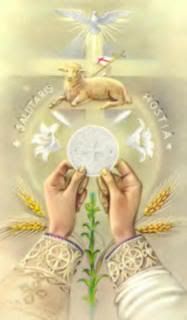Which brings to mind a little story I ran a few years ago - here it is again, from the archives:
(Yes, folks, it's satire)
DAVENPORT, IOWA -- While Catholics across the country pray for an end to the religious vocations crisis, many parishes are now reporting a sharp decline in extraordinary ministers, the lay volunteers who distribute communion to parishoners.
"It has gotten so bad we only have two eucharistic ministers for every one parishoner," said Nelda Roarke, an extraordinary minister at Sacred Heart Catholic Church in Davenport, Iowa. "I can remember the days when we had more people up here with the priest than we had people in the pews," Roarke said. "It looks like those days may be gone."
Gina Louvain, an extraordinary minister at Queen of Mercy Catholic Church in Birmingham, Ala., said she thinks people at her parish are just losing their commitment to service. "I guess people are just more interesting in praying in their pews or contemplating Christ or something, whatever that means," she said.
"I've heard at one parish that the priest actually distributes communion by himself now," said Louvain.
In an attempt to counter the shortage, Roarke is hosting a spiritual retreat for current extraordinary ministers, as well as for those who feel God may be calling them to the job. "People need to know about the rich spiritual heritage eucharistic ministers have," Roarke said. "Why, I believe, Saints Peter and Andrew helped Jesus distribute bread and wine to the other disciples at the Last Supper. Well, at least that is what I am telling people anyway."
She has also designed buttons for extraodinary ministers to wear that state: I'm Extraordinary. "I think the Garmond font will really grab people," Roarke said. "The first thing parishoners will notice when they go up to receive communion is this button. It will remind them whose presence they are in."
Benny Fiedler, who serves as an extraordinary minister at St. John the Baptist Church in El Paso, Texas, said he hopes people will heed the call and start volunteering again. "Sometimes Catholics just don't realize what they have," he said. "Back when Catholics used to believe these hosts were actually Jesus' body, nobody but the priest would be allowed to touch them. But now that we have advanced in our wisdom and knowledge, we are now allowed to do almost as much as the priests do."













9 comments:
i have awarded you a blog award which shirley gave to me, and i passed it on to you:) see my post about the award:)
man, iam glad we don't have EMHC in our church!
oh, and i responded to your comment in my post about Saint Pius X.
Hey even in India they are called Eucharistic Ministers. Of course back home we have a lot of priests so I never understood why we needed them. I made it a habit in India to walk to where the priest was and receive communion from Him.
Extraordinary Ministers of Holy Communion is what this Canadian persists in calling it. I am one and I agree there's not much extra-ordinary about it. As a convert I am conflicted though. Do I say thank you Lord and participate with humility in the service which I was asked to take part or do I withdraw because it does seem to be an aberration of the original intent?
Owen, If I were you, I would withdraw. St Thomas Aquineas said, "Because out of reverence towards this sacrament, nothing touches it, but what is consecrated; hence the corporal and the chalice are consecrated, and likewise the priest's hands, for touching this sacrament."
I firmly believe a lay person should not lay hands on the Sacred Host. Our hands have not been consecrated for touching the Body of Our Lord - O how will we ever explain to God how we so casually laid our impure hands on His Most Sacred Body?
As a convert there is so much to learn and unleard all at once and especially being a convert post VII.
In reading my comment above I should clarify that when I said there's not much extra ordinary in it I meant in the way it is administred. Naturally our Lord is beyond even extra ordinary. Thanks paramedicgirl for your thoughts. It's a tough choice as it is something clearly allowed by our Church in a vaild N.O. Mass.
Owen yes, learning Catholicism is like learning to speak a foreign language. Little by little you get more familiar with it. And yes, the Catholic Church does now allow EMHC, but that is a very recent innovation. I have a suspicion it won't last. Forty years in the history of the Church is a blink in time, and Pope Benedict XVI has turned the tide back towards tradition, one page at a time. God bless him.
I catch myself calling the EOMHC's Eucharistic Ministers (quite frankly the title's too long, lol) Kind of like the religious priests with REALLY long names. Br. Cyril of Alexandria of the 5 Holy Wounds of Jesus of Our Lady of Mt. Carmel...(yes, it's satire, I don't know any Br. with that name, although it'd be really cool if someone did have that name)
The Church in America is exactly the same.
I'm very strict and only go to the priest to receive Communion.
The more I learn, the more I love Tradition :)
Post a Comment